De Hongaarse dichter János Arany werd geboren op 2 maart 1817 in Nagyszalonta. Zie ook alle tags voor János Arany op dit blog.
Uit: Toldi (Fragment)
But no, he does not care how it sifts the road
from end to end – through a tower of dust erected
by the wind, proud weapons glitter, proud troops
ascend. A cloud of sighs rises from his heart like
those hazy troops. And bending forward, he stares
and stares as though heart and soul were fixed
in his eyes.
‘Neat Hungarian cavaliers, shining knights! How beat
and bitter am I to see you. Where are you bound? How
far? Into battle? To gather flowers for a wreath of
glory? Are you riding against Tatars, Turks? To bid
them good night forever? Ah, if I too, I too were
only riding. Neat Hungarian cavaliers, shining knights!’
These were the thoughts that furrowed into Miklós
Toldi’s soul. His head churned, and his heart was
wrung with sadness because he too was the son of a
knight. György, his false brother, was reared as
a companion of the royal heir. He lives it up in
the royal court while Miklós mows and rakes with
the hired hands.
Here they come, the mounted men of the Palatine
Laczfi, and at the head of his proud troops Endre
Laczfi himself. He sits with martial bearing on
his fallow horse, braids of gold on his robe. In
his train dashing young men ride in fancy saddles
on stamping stallions. Miklós stares and stares,
not knowing his eyes are sore for staring so hard.
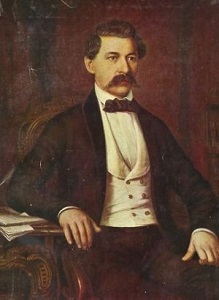
János Arany (2 maart 1817 – 22 oktober 1882)
Portret door Barabás Miklós, 1856
De Russische dichter Jevgeni Baratynski werd geboren op 2 maart 1800 in Sint Petersburg. Zie ook alle tags voor Jevgeni Baratynski op dit blog.
Last Poet (Fragment)
The age proceeds along its iron path,
All hearts a brim with greed; and every hour
Our common dreams grow ever more obsessed
With shameless profit and mundanity.
And in the light of learned reason
All childish dreams of poetry dissolve.
Devoted to industrious pursuits
The young no longer heed them.
Hellas is awake once more
To triumphant liberty,
Gathered are its citizens
And upraised are its capitals;
Science flourishes there once more,
The Pont teem once again with trade
But no more are the lyre’s sounds heard
Within the Muses’ ancient heav’n.
The winter of the world enfeebled now doth shine
And shine! Mankind grows stern and pale;
But Homer’s land is blooming forth,
Hills, forests, and the banks of azure lakes.
Parnassus blooms! Below it, as before,
Castalian waters rush in streams;
Unheralded child of Nature’s dying strength,
Behold a Poet — he strolls and sings.
With simple heart he sings
Of love and beauty,
And science disobedient
Is thin and vain for him:
He cures our temporary sufferings
With his lighthearted play.
’tis better, mortals, for the earth
To feel delight in ignorant days.
Cruel laughter answers him; his hands
Lie motionless upon his lyre,
His lips, once parted, now press closed,
Though his proud head bends not:
In thought he aims his step
Into the wordless, empty wild; but the world’s
no more an empty cave,
No lonely place remains.
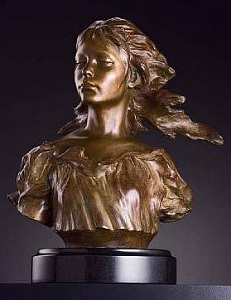
Jevgeni Baratynski (2 maart 1800 – 11 juli 1844)
Poetry 2006 door Frederick Hart
De Russisch-joodse schrijver Sholom Aleichem werd geboren in Pereyslav bij Kiev op 2 maart 1859. Zie ook alle tags voor Sholom Aleichem op dit blog.
Uit: Elijah the Prophet
“Daddy put on his best kapoteh [ritual prayer garment] and went to daven in shul. Mama says to me: “You know what? Lie down. Get some sleep. Then you can sit through the Seder. Then you can ask Daddy the Fir Kashyas [“Four Questions”]. What, am I meshugeh? I should go to sleep before the Seder? “Remember this, on Paysach one must not sleep at the Seder. If God forbid you should fall asleep at the Seder, then Eli Novi goes about and looks for those sleeping at the Seder and takes them away in his sack.” Ha, ha. I should fall asleep at the Seder? Me? If they should sit the whole night? Even if it were till the light of morning? What happened last year mama? “Last year, you went to sleep right after Kiddush.” “Then why didn’t Eli Novi come for me then with his sack?” “Then you were a kleinitschke. Now, you’re bigger. Tonight, you must ask daddy the Four Questions. Tonight, you must say with Daddy, Avodim Hayinu [Passover passage from haggadah]. Tonight, you must eat fish and soup and kneidlach with us…shah, Daddy’s coming back from shul.
“Gut yontof.”
“Gut yontof.”
Thank God. Daddy finished up the Kiddush. Me too. Daddy drank up the first cup. Me too. A full one too and to the very bottom. “Look, to the very bottom,” says Mama to Daddy. She says to me: “A whole cup of wine? You’ll fall asleep.” Ha, ha. Me? If they should sit the whole night? Even till the light of morning? Ah, nu, ask Daddy, how did I rattle off the Four Questions? How did I say the hagodeh? How do I shuckle over the siddur and sing with Daddy Avodim Hayinu? Mama keeps her eye on me, smiles and says to me: “You’ll fall asleep, fall asleep.” Ach, Mama, Mama. It seems to me that even with eight heads, one would still fall asleep from these words alone. Ah, nu, let them sit down by you and sing in your ear: “Fall asleep, fall asleep.”
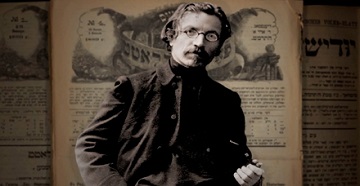
Sholom Aleichem (2 maart 1859 – 13 mei 1916)
De Britse schrijfster Olivia Manning werd geboren op 2 maart 1908 in Portsmouth. Zie ook alle tags voor Olivia Manning op dit blog.
Uit: The Balkan Trilogy (The spoilt city)
“His tone was conclusive: he stood upright, preparing to depart.
David moved forward. “In my opinion,” he said, “this could have been helped.”
“Indeed!” The chairman paused in surprise.
“We lost this country months ago through a damn-fool policy of supporting Carol at no matter what cost to the rest of the community. The better elements here refused to serve under such a rule. Maniu and the other liberals would have been with us, but we had no use for them. We kept a pack of scoundrels in power. No wonder the country was divided against itself.”
“Ah!” Sir Brian was non-committal: a just man, he was prepared to hear all sides. “And what are the facts, as you see them?”
Wheeler rubbed his brow in a despairing way.
Speaking authoritatively, all diffidence gone now, David said: “A united Rumania—a Rumania, that is, who’d won the loyalty of her minorities by treating them fairly—could have stood up to Hungarian demands. She might even have stood up to Russia. If she’d remained firm, Yugoslavia and Greece would have joined with her; perhaps Bulgaria, too. A Balkan entente! Not much perhaps, but not to be sneezed at. With the country solid, enjoying a reasonable internal policy, the Iron Guard could never have regained itself. It could never have risen to power in this way.”
Sir Brian, hands together on his umbrella-handle as on a gun-butt, stood upright, head bowed at the neck in an attitude of mourning.
Wheeler cleared his throat, preparing to arrest this indictment, but David was not easily arrested. “And,” he persisted, “there were the peasants—a formidable force, if we’d chosen to organise them. They could have been trained to revolt at any suggestion of German infiltration.”
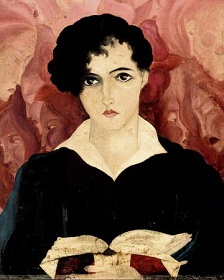
Olivia Manning (2 maart 1908 – 23 juli 1980)
Zelfportret
De Franse schrijver en letterkundige Pascal Rannou werd geboren op 2 maart 1958 in Laval. Zie ook alle tags voor Pascal Ramou op dit blog.
Uit: Tristan Corbière, visionnaire excentrique du pays de Morlaix
“Le nom de Tristan Corbière est depuis longtemps familier aux oreilles des morlaisiens, ne serait-ce que parce qu’il désigne leur lycée. Ce n’est pourtant pas un patronyme breton. De fait, le grand-père du poète était originaire de l’Aquitaine. Militaire, il caserna à Brest, où naquit son fils Édouard. Ce dernier, après une carrière maritime mouvementée, créa en 1839 la liaison par bateau entre Le Havre et Morlaix, où il séjourna de plus en plus, pour finir par s’y installer et y fonder famille. C’est donc en premier lieu grâce à Édouard que le nom des Corbière fut connu. Notable respecté, auteur de romans maritimes à succès, membre du conseil municipal, président de la Chambre de commerce, cet infatigable homme d’action fit installer dans sa cité le pont tournant et l’éclairage au gaz, et créa par ailleurs les régates de Locquénolé. L’ironie de la postérité fait que le père survit aujourd’hui grâce au fils, auteur d’un recueil poétique unique et visionnaire : Les Amours jaunes. La presse de l’époque ne signala pourtant qu’à peine la mort de Tristan…”
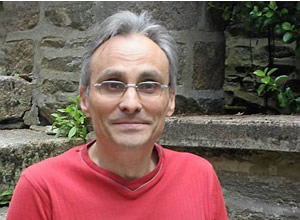
Pascal Rannou (Laval, 2 maart 1958)
De Duitse dichter en schrijver Gerhard Anton von Halem werd geboren op 2 maart 1752 in Oldenburg. Zie ook alle tags voor Gerhard von Halem op dit blog.
Aphorismen
Nie aus der Wahrheit ist so viel Gutes erwachsen,
Als aus der Wahrheit Schein Böses erwächst in der Welt.
*
Wohl zu besänftigen ist die Leidenschaft. Doch Überzeugung, grub sie Verstand ins Gemüth, bleibt unvertilgbar der Zeit.
*
Da herrscht ewig Friede, wo über die Seele Vernunft herrscht.
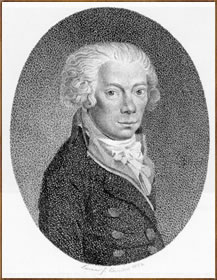
Gerhard von Halem (2 maart 1752 – 4 januari 1819)
